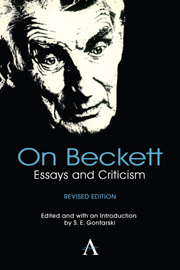Book contents
- Frontmatter
- Contents
- The Essential Beckett: A Preface to the Second Edition
- A Beckett Chronology
- Acknowledgments
- Crritics and Crriticism: “Getting Known”
- Preliminaries
- The Page
- The Stage
- MacGowran on Beckett
- Blin on Beckett
- Working with Beckett
- Notes from the Underground: Waiting for Godot and Endgame
- Beckett Directs Godot
- Beckett Directs: Endgame and Krapp's Last Tape
- Literary Allusions in Happy Days
- Counterpoint, Absence, and the Medium in Beckett's Not I
- Rehearsal Notes for the German Premiere of Beckett's That Time and Footfalls
- Footfalls
- Samuel Beckett and the Art of Radio
- Light, Sound, Movement, and Action in Beckett's Rockaby
- Beckett's Ohio Impromptu: A View from the Isle of Swans
- Quad and Catastrophe
- Coda
- Notes on Contributors
Literary Allusions in Happy Days
from The Stage
Published online by Cambridge University Press: 05 May 2013
- Frontmatter
- Contents
- The Essential Beckett: A Preface to the Second Edition
- A Beckett Chronology
- Acknowledgments
- Crritics and Crriticism: “Getting Known”
- Preliminaries
- The Page
- The Stage
- MacGowran on Beckett
- Blin on Beckett
- Working with Beckett
- Notes from the Underground: Waiting for Godot and Endgame
- Beckett Directs Godot
- Beckett Directs: Endgame and Krapp's Last Tape
- Literary Allusions in Happy Days
- Counterpoint, Absence, and the Medium in Beckett's Not I
- Rehearsal Notes for the German Premiere of Beckett's That Time and Footfalls
- Footfalls
- Samuel Beckett and the Art of Radio
- Light, Sound, Movement, and Action in Beckett's Rockaby
- Beckett's Ohio Impromptu: A View from the Isle of Swans
- Quad and Catastrophe
- Coda
- Notes on Contributors
Summary
Discussing Godot with Beckett, Colin Duckworth asked, “Is a Christian interpretation of the play justified?” Beckett responded, “Yes, Christianity is a mythology with which I am perfectly familiar. So naturally I use it.” The response is something of an understatement, for Beckett's corpus is saturated with Christian mythology and variations on its ideology. He is as tied to Christian thought as Lucky is to Pozzo, as obsessed with Christian dogma and its implications as was Joyce. Maria Jolas suggests, “Like Joyce he is also a Christ-haunted man.…” And little wonder. Born 13 April 1906. Friday the thirteenth. Good Friday the thirteenth. On the 606th anniversary of Dante's descent into Hell. A persistent theme of Beckett's is divine caprice, the arbitrary nature of salvation, a theme that haunts his plays like the ghost of King Hamlet. In Godot, one of Estragon's feet is comfortable, one in pain; one of his feet is saved, one damned. Beckett is fond of quoting a sentence from Augustine (ostensibly for its shape): “Do not despair; one of the thieves was saved. Do not presume; one of the thieves was damned.” The sentence indeed has a fine shape and balance, but it imposes shape on chaos.
- Type
- Chapter
- Information
- On BeckettEssays and Criticism, pp. 232 - 244Publisher: Anthem PressPrint publication year: 2012
- 1
- Cited by

